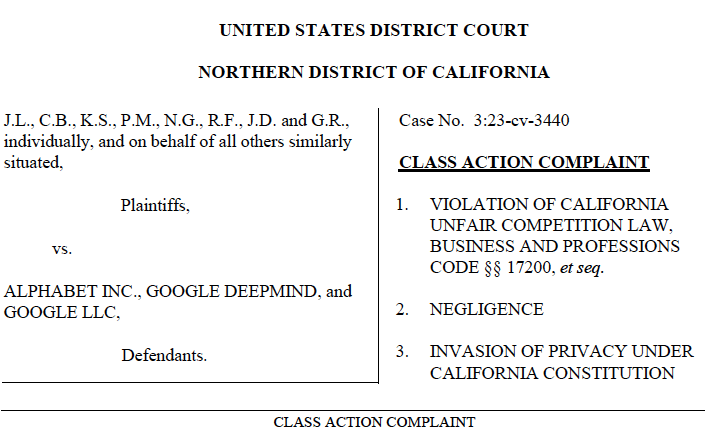
In a recent legal battle, Google has petitioned a California federal court to dismiss a proposed class-action lawsuit that alleges the company’s data-scraping activities for training generative artificial intelligence (AI) systems infringe on millions of individuals’ privacy and property rights.
The tech giant firmly maintains that the utilization of publicly available data is essential for advancing systems like its chatbot Bard. Google argues that the lawsuit would not only impact its services but could also undermine the very essence of generative AI.
“Using publicly available information to learn is not stealing,” Google asserted in its defense. “Nor is it an invasion of privacy, conversion, negligence, unfair competition, or copyright infringement.”
This lawsuit, which was initiated by eight unnamed plaintiffs in San Francisco in July, alleges that Google has been surreptitiously collecting and utilizing content from social media and its own platforms to train AI systems. This case is part of a growing trend in legal actions against tech companies over the alleged misuse of data, whether it’s from books, visual art, source code, or personal information for AI training.
The complaint describes the allegations in greater detail, asserting that Google had secretly amassed vast quantities of information from the internet, encompassing personal and professional data, creative and copyrighted works, photos, emails, and more, without the knowledge or consent of the users.
The complaint continues to argue that this massive data theft is not unique to Google but is a common practice in the AI industry, as large language models depend on extensive data to enhance their capabilities. It references a stern warning from the Federal Trade Commission (FTC) to the AI industry, emphasizing the need for lawfully collected data.
Despite the public backlash, Google recently doubled down on its data collection practices, amending its online privacy policy to assert its right to use internet content for its own gain and to improve AI products like Bard.
The plaintiffs also highlight that Google’s admission came shortly after OpenAI faced a lawsuit for alleged theft and commercial misappropriation of internet users’ personal data, which was also conducted secretly without consent.
In response to the public outrage, Google invited discussions on data collection and protection in the AI era. However, this move was met with skepticism, as many felt it was a belated attempt to address the issue after training their AI models on personal and copyrighted content without permission.
The complaint further states that Google had lawful options to acquire data for AI training, as there is a commercial market for such data. Some companies specialize in curating datasets with the consent of content creators, making this a legal and ethically sound approach.
In contrast, Google’s alleged practices not only violate the rights of millions but also provide the company with an unfair advantage over competitors who lawfully obtain AI training data.
The complaint also accuses Google of illegally accessing restricted websites and infringing on copyrighted materials, emphasizing the need for Google to cease its violations of privacy and property rights and offer options for users to opt out of data collection. It suggests that Google either delete illegally obtained data or compensate the data owners fairly.
Ultimately, the lawsuit poses significant challenges to Google’s data-scraping practices and raises critical questions about the balance between AI development and the protection of individual rights. The legal battle is sure to be closely watched by industry experts and privacy advocates alike.
This article was written by AI and edited by Bill Hartzer.